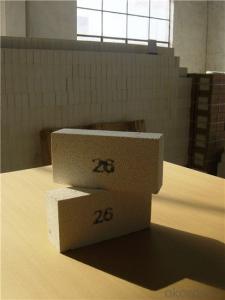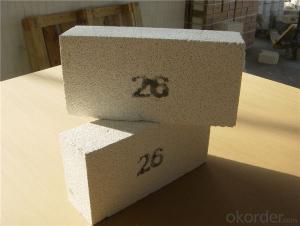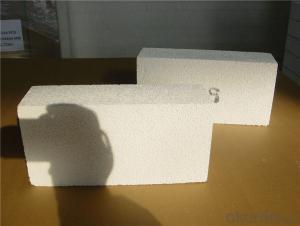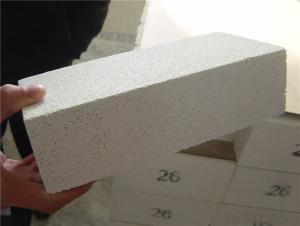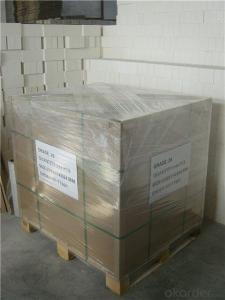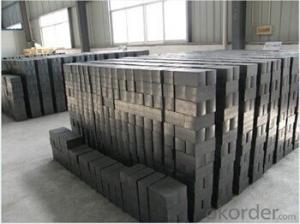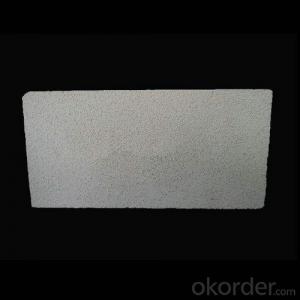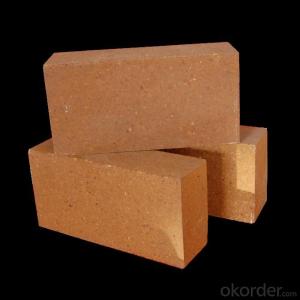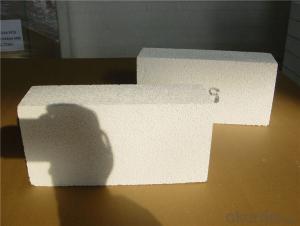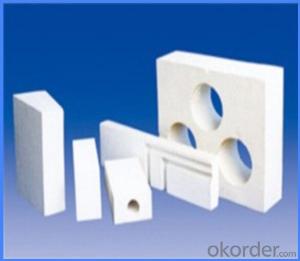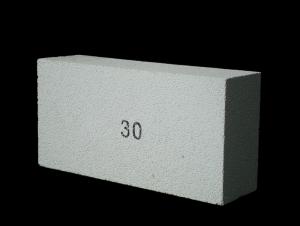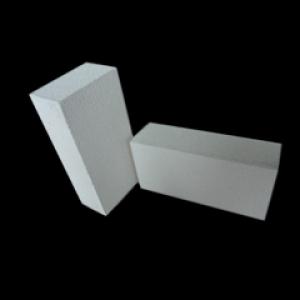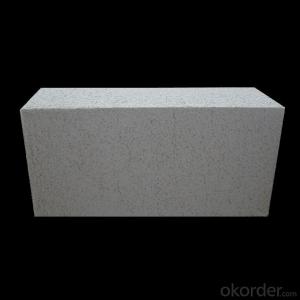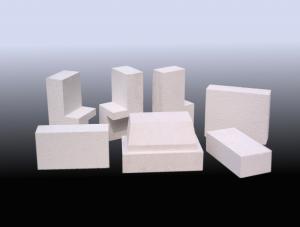Fire Insulation Brick Fire Clay Bricks for Furnance
- Loading Port:
- Shanghai
- Payment Terms:
- TT OR LC
- Min Order Qty:
- 1 m.t.
- Supply Capability:
- 1000 m.t./month
OKorder Service Pledge
OKorder Financial Service
You Might Also Like
Thermal Insulation Fire Clay Brick
Refractory brick is a block of refractory ceramic material used in lining furnaces, kilns, fireboxes, and fireplaces.
We provide high quality Refractory Fire Bricks that are used on wide range in the various industries like Cement, Glass and Steel. Refractory Fire Bricks are provided as per the quantity and specifications required by the customers. We provide an extensive range of Refractory Fire Bricks at reasonable prices that depend upon the quantity ordered.
Application
Insulating Fire Brick are used for the lining of converter, alternating current arc furnace, direct Current arc furnace and the ladle slag line, etc.
Company Advantage
(1)Long Insulating Fire Brick manufacture history: 25 years manufacturer
(2)Advanced equipment
(3)Diversification of production standards: ISO ANSI FEPA JIS ASTM
(4)Flexible payment: T/T L/C D/P D/A
(5)Professional marketing team and after-sale service
Insulating Fire Brick main feature:
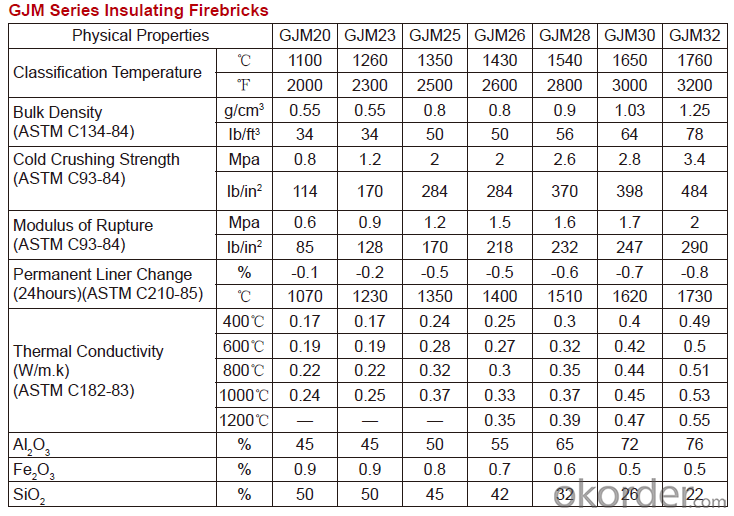
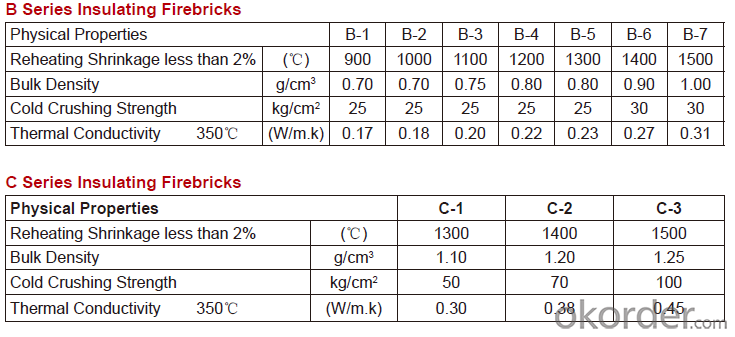
Equipment
1 unit of Ceramic Abrasive (SG Abrasive) pilot production line
2 units of Compact grain Abrasive pilot production lines
1 unit of high-end coated abrasives (abrasive cloth) production line
2 units of Boron Carbide production lines
3 large flexible crushing and sieving lines for grit production lines
6 units of 5000KVA-10000KVA dumping type electric arc furnaces for Brown Fused Alumina fusion
Q1 What’s the transport method?
A1 FCL delivery goods with wooden pallet or wooden case by sea; If LCL delivery, must with wooden case; Sometimes need open top, flat rack or bulk cargo.
Q2 What’s the required payment term?
A2 Generally 30% TT as the prepayment, 70% TT before delivery. If need, 100% Irrevocable Letter of Credit or negotiation.
Q3 Which country are our products exported to?
A3 Apart from entire Chinese market, the US, Russia, Japan, Korea, Australia and some Southeast Asian Nations.
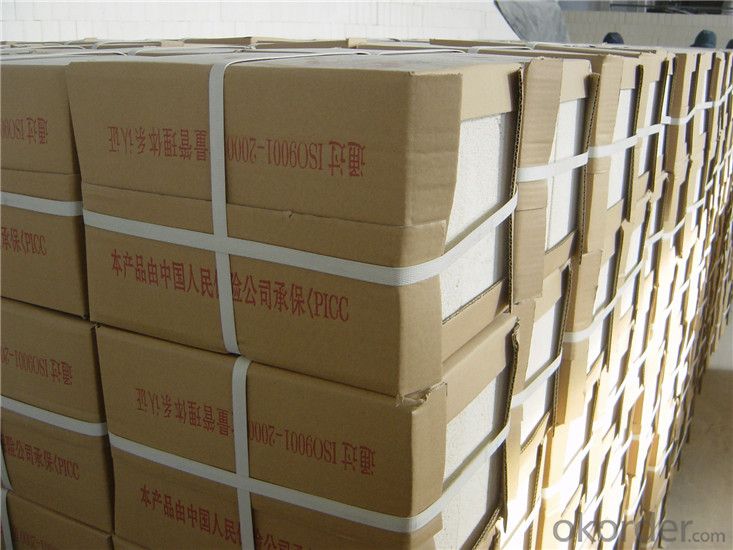
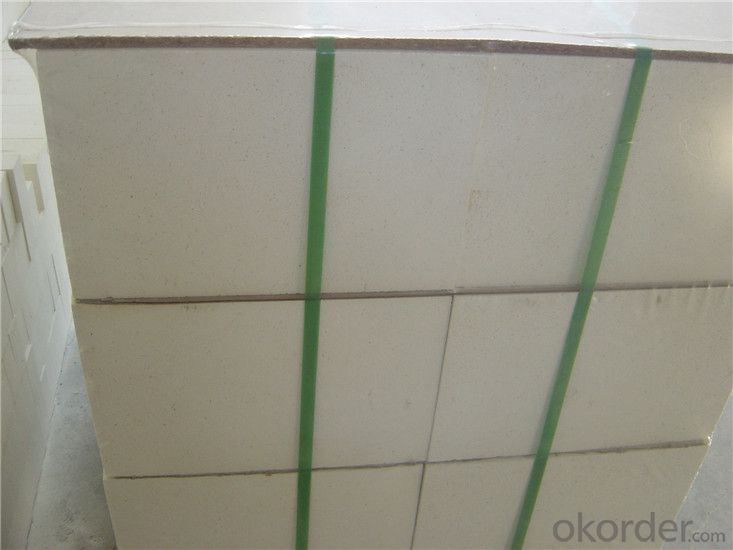
- Q:Are insulating fire bricks resistant to impact or mechanical stress?
- Indeed, insulating fire bricks exhibit resistance against impact and mechanical stress. These bricks are crafted using lightweight refractory materials, purposefully formulated to endure extreme temperatures and thermal shock. Their composition is specifically engineered to possess exceptional resilience against mechanical stress and impact, rendering them appropriate for a multitude of applications in which external forces or pressure may be exerted upon them. Remarkably, these bricks retain their structural integrity and durability, safeguarding their shape and thermal insulation attributes even when subjected to mechanical stress or impact. Consequently, they are highly recommended for deployment in furnaces, kilns, and other environments characterized by elevated temperatures.
- Q:Can insulating fire bricks be used in solar power plants?
- Insulating fire bricks have the ability to be utilized in solar power plants. These bricks are specifically designed to possess exceptional thermal insulation properties, thus making them suitable for various applications that demand resistance to heat and energy efficiency. Solar power plants frequently experience high temperatures and the necessity to retain heat, particularly in concentrated solar power (CSP) systems. By using insulating fire bricks to line the walls and floors of CSP receivers and thermal storage systems, the loss of heat can be minimized and the conversion of solar energy into electricity can be maximized. Furthermore, insulating fire bricks can also find utility in other components of solar power plants, such as the insulation of solar panels or the construction of solar tower structures.
- Q:Can insulating fire bricks be used in paper mills?
- Yes, insulating fire bricks can be used in paper mills. Insulating fire bricks are commonly used in industries that require high-temperature insulation, such as steel, glass, and ceramics. In paper mills, where processes like drying, heating, and burning occur, insulating fire bricks can be used to line kilns, furnaces, and other equipment to provide insulation and prevent heat loss. These bricks have excellent thermal insulation properties and can withstand high temperatures, making them suitable for use in paper mills where heat is a crucial component of the manufacturing process. Additionally, insulating fire bricks are lightweight and have low thermal conductivity, allowing for efficient heat retention and energy savings.
- Q:Are insulating fire bricks suitable for use in blast furnaces?
- Insulating fire bricks are not suitable for use in blast furnaces. Blast furnaces operate at extremely high temperatures, often exceeding 2000 degrees Celsius, and require refractory materials that can withstand such intense heat. Insulating fire bricks are designed to have low thermal conductivity, which means they are efficient at reducing heat transfer. However, this property also makes them vulnerable to damage and degradation in high-temperature environments. In blast furnaces, where molten iron and other materials are processed, the refractory lining needs to have high thermal shock resistance, good mechanical strength, and resistance to chemical corrosion. Therefore, specialized refractory materials, such as high-alumina or silica refractory bricks, are preferred for blast furnace linings due to their ability to withstand the extreme conditions and maintain structural integrity.
- Q:Can insulating fire bricks be used in the insulation of boilers?
- Yes, insulating fire bricks can be used in the insulation of boilers. Insulating fire bricks are designed to withstand high temperatures and are highly effective at insulating against heat transfer. They have low thermal conductivity, which means they can help reduce heat loss from the boiler and improve its overall energy efficiency. Additionally, insulating fire bricks are lightweight and easy to install, making them an ideal choice for boiler insulation.
- Q:Can insulating fire bricks be used in the construction of crucibles?
- Yes, insulating fire bricks can be used in the construction of crucibles. These bricks are designed to withstand high temperatures and provide excellent insulation, making them suitable for use in crucibles where extreme heat is required.
- Q:Are insulating fire bricks suitable for applications with high mechanical stress?
- No, insulating fire bricks are not suitable for applications with high mechanical stress. They are designed to provide thermal insulation rather than mechanical strength, so they may crack or break under high mechanical stress.
- Q:Can insulating fire bricks be used for insulation in smelting furnaces?
- Yes, insulating fire bricks can be used for insulation in smelting furnaces. They are designed to withstand high temperatures and provide excellent thermal insulation, making them an ideal choice for smelting furnace insulation to minimize heat loss and improve energy efficiency.
- Q:How do insulating fire bricks affect the overall cost of a project?
- Insulating fire bricks can have a significant impact on the overall cost of a project, both in terms of immediate expenses and long-term savings. While insulating fire bricks may be more expensive upfront compared to traditional bricks, their superior insulation properties can result in substantial cost savings over time. One of the primary benefits of insulating fire bricks is their ability to retain heat and prevent heat transfer. This means that less energy is required to heat or cool a space, resulting in reduced energy consumption and lower utility bills. In industrial settings, insulating fire bricks can help optimize the efficiency of furnaces, kilns, and other high-temperature equipment, leading to greater productivity and lower operational costs. Moreover, insulating fire bricks offer excellent thermal insulation, which helps maintain a stable and comfortable indoor environment. This can be especially advantageous in residential and commercial construction, as it reduces the reliance on heating and cooling systems, further reducing energy consumption and associated costs. Additionally, insulating fire bricks are highly durable and resistant to high temperatures, chemical corrosion, and mechanical stress. This durability reduces the need for frequent repairs or replacements, resulting in long-term cost savings. Their lightweight nature also makes them easier to handle and install, potentially reducing labor costs during construction. Furthermore, insulating fire bricks have a longer lifespan compared to traditional bricks, which can contribute to lower maintenance and replacement costs over time. Their ability to withstand extreme temperatures and harsh environmental conditions means that they are less likely to deteriorate or require frequent repairs. In summary, while insulating fire bricks may have a higher initial cost, their superior insulation properties, energy efficiency, durability, and reduced maintenance needs can lead to significant cost savings over the lifespan of a project. It is important to consider the long-term benefits and potential energy savings when assessing the overall cost-effectiveness of using insulating fire bricks in a construction or industrial project.
- Q:Can insulating fire bricks be used in the construction of thermal storage units?
- Yes, insulating fire bricks can be used in the construction of thermal storage units. Insulating fire bricks are specifically designed to have high insulation properties, making them an ideal choice for thermal storage units. These bricks are made from lightweight materials with low thermal conductivity, allowing them to retain heat for extended periods of time. Thermal storage units are used to store and release heat energy when needed. The insulating fire bricks help to minimize heat loss from the stored energy, ensuring efficient and effective thermal storage. Their high insulation properties allow for better heat retention, reducing the need for constant heating or cooling. Additionally, insulating fire bricks are durable and can withstand high temperatures, making them suitable for the construction of thermal storage units. They can handle the thermal stresses and temperature fluctuations that occur during the heating and cooling cycles of the unit, ensuring its longevity and reliability. Overall, insulating fire bricks are a suitable and beneficial choice for the construction of thermal storage units due to their high insulation properties, durability, and ability to withstand high temperatures.
1. Manufacturer Overview |
|
|---|---|
| Location | |
| Year Established | |
| Annual Output Value | |
| Main Markets | |
| Company Certifications | |
2. Manufacturer Certificates |
|
|---|---|
| a) Certification Name | |
| Range | |
| Reference | |
| Validity Period | |
3. Manufacturer Capability |
|
|---|---|
| a)Trade Capacity | |
| Nearest Port | |
| Export Percentage | |
| No.of Employees in Trade Department | |
| Language Spoken: | |
| b)Factory Information | |
| Factory Size: | |
| No. of Production Lines | |
| Contract Manufacturing | |
| Product Price Range | |
Send your message to us
Fire Insulation Brick Fire Clay Bricks for Furnance
- Loading Port:
- Shanghai
- Payment Terms:
- TT OR LC
- Min Order Qty:
- 1 m.t.
- Supply Capability:
- 1000 m.t./month
OKorder Service Pledge
OKorder Financial Service
Similar products
New products
Hot products
Related keywords
